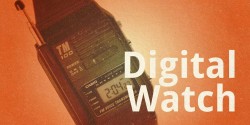The most significant digital radio news this week is the FCC’s vote on Open Internet rules happening at Thursday’s open meeting. The proceedings begin at 10:30 AM EST, and will be streamed live.
I posted an overview on Tuesday, and things haven’t changed much since then. The House Communications and Technology Subcommittee held a hearing Wednesday where Republican lawmakers warned that the new rules will be tested in court and fail. But that was mostly smoke, with no fire.
Subcommittee Chair Greg Walden and Commerce Committee Chair Fred Upton have introduced a bill that would prohibit many of the things targeted by the Open Internet proposal, like paid prioritization of content (a/k/a internet fast lanes), but at the expense of giving the FCC less authority over internet service providers. House Democrats are unlikely to sign on, and according to the New York Times senior congressional Republicans concede that without Democratic support no alternative net neutrality legislation is going to pass.
All five commissioners have a few hours left to work behind the scenes on edits they would like to see introduced into the final proposal, so the rules aren’t written in stone yet. We’ll be watching the FCC tomorrow to learn what the future of internet will be.
Slate Debuts Panoply Podcast Network
On the podcasting front, The Slate Group announced a new podcast network called Panoply with media partners like The New York Times Magazine, HBO Documentary Films and The Huffington Post. Right now the company says it has “12 commitments from a total of 18 shows,” and is adding a new Slate podcast, Whistlestop with John Dickerson. These join Slate’s fifteen existing podcasts, like Political Gabfest.
Slate has been producing podcasts for a decade, upping its investment last year with new shows like The Gist with Pike Pesca, Slate Money and Lexicon Valley, primarily featuring personalities already on or recruited to the company’s roster. The new network is a big move, and represents a branching out to assist other companies in creating podcasts featuring their own talent, and then co-branding them under the Panoply name.
The podcasting train blasts forward, full-speed ahead.
BBC Internet Changes Upset Listeners
Apparently, many listeners are upset because their internet radios will no longer play some BBC stations. According to a blog post from the BBC’s Head of Media Services Henry Webster, this situation is due to a couple changes, mostly having to do with updating infrastructure to use more modern formats and protocols. Formats are the kind of file, like MP3 or AAC, which the audio is encoded in. Protocols are the way these streams are delivered to players.
First, the broadcaster has ended support for Windows Media Audio (WMA) streaming, a standard that dates back to the 90s which Webster says accounted for 2–5% of the Beeb’s online listening. Complicating the situation was the fact that there was no way to know what devices were accessing the WMA streams, making it difficult to know which manufacturers to contact ahead of the change, resulting in some radios losing these broadcasts.
Second, the BBC changed the way it served SHOUTcast MP3 streams, also relied upon by many devices, causing inconsistent playback for some. These are now defaulted to deliver 128kbps MP3 streams, whereas before many stations were available in a higher quality and higher bitrate 320kbps stream. The high quality versions are now only offered in a 320kbps AAC stream in a protocol that isn’t supported universally. In particular users of the Logitech Squeezebox or Sonos system are only receiving the lower bitrate MP3 stream.
The downgrade to the the Radio 3 classical music service, particularly rankled many listeners. Due to the outcry the MP3 version of Radio 3 has now been restored.
The BBC says it is working with device manufacturers, like Logitech, to resolve the problems so that more devices can access the high quality AAC streams. Listeners who use the BBC’s website or apps are not affected.
Problems like these affect plenty of other internet broadcasters. It’s just that most don’t offer 57 different streams to such an enormous global audience, so we rarely hear about them. However, the situation does highlight an enormous difference between terrestrial and internet radio. Broadcast standards change only about every 25 years or so, and so far these updates–like adding stereo or HD Radio–have been backwards compatible. Your 1960s transistor radio receives local FM stations just as well as a new one fresh out of the box.
By contrast, there is no single standard for internet radio, and no single standards body to define one. Now, the situation is better than in the early 2000s when there were competing and incompatible formats like RealAudio and Windows Media Audio alongside MP3, often forcing broadcasters to offer up three or more separate feeds. Nevertheless, the SHOUTcast MP3 standard that the BBC is moving away from is some fifteen years old, which seems ancient in internet terms.
The flip side is that internet radio can innovate, adding features and improving sound quality, more quickly than terrestrial broadcast. The only caveat is that migrating to new formats or protocols threatens to leave some percentage of listeners behind.
Because it is perhaps the world’s predominant radio broadcaster, the BBC’s experience likely will serve as a case study for other broadcasters. Thinking optimistically, it might even provoke a little more collaboration between internet broadcasters and device manufacturers. That would be nice.



